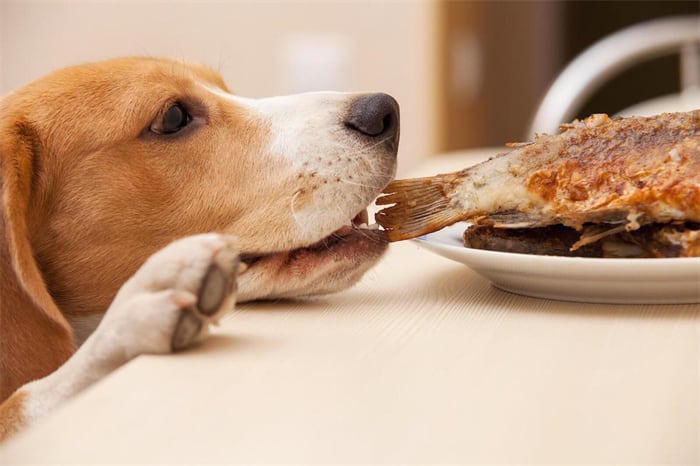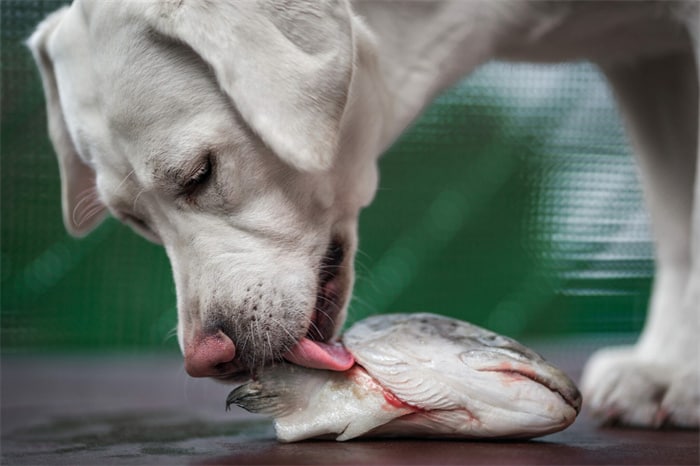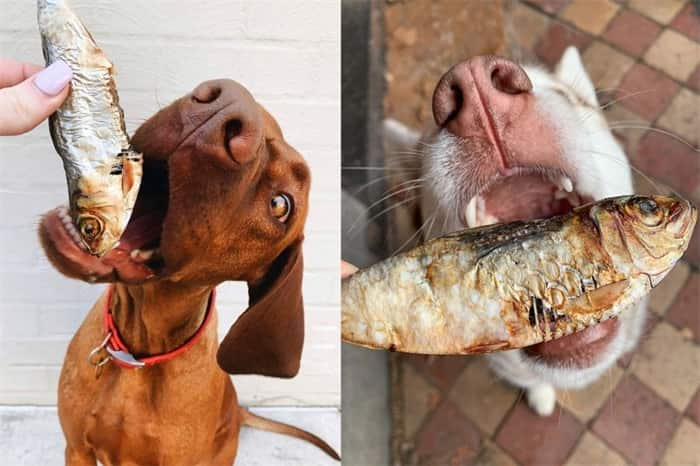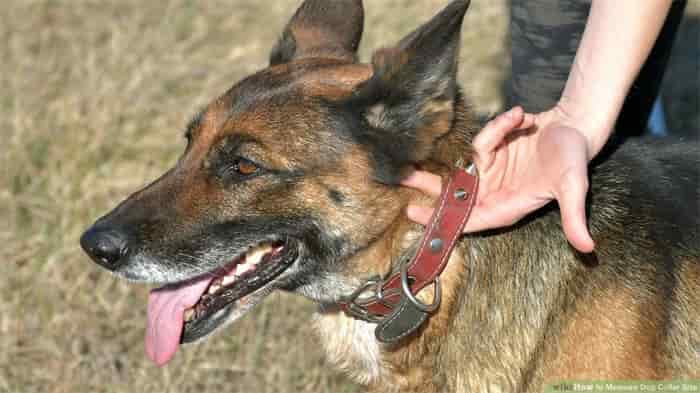Can a Dog Eat Fish Bones

If you’ve ever glanced at your dog’s food’s ingredient list or looked at other brands of dog food in the grocery store, you know that fish is commonly included on the menu. But just because fish is a component in dog food doesn’t mean that dogs can eat whatever fish we give them without any problems. Dogs enjoy eating fish. Most dogs can’t help but steal a mouthful of any table food you leave out while you’re not looking because it’s a natural source of protein and fatty amino acids. But if the fish your dog ate contained bones, this might be an issue.
Continue reading to find out what to do if your dog chews fish bones and when to take them to the clinic. Here is everything you need to know if you want to give your dog a fishy treat.
Can a dog eat fish bones?
No, it is not safe for dogs to eat fish bones. Never let your dog consume fish bones.
Everyone knows how small and fragile fish bones are. They can smuggle themselves inside the mouth, throat, stomach, and intestines of your dog, occasionally even piercing the organ wall. This can lead to an expensive trip to the vet in addition to being painful. Despite several anecdotal reports of dogs eating fish bones without any problems, it is best to err on the side of caution in this case and follow the veterinarians’ recommendations.

While fish is a safe and healthful meat for dogs, the bones might harm or obstruct the intestines. Continue reading to find out what to do if your dog chews fish bones and when to take them to the clinic.
Can dogs eat fish bones raw?
Dogs shouldn’t consume raw fish bones, either. Any bone can be harmful to your dog, but raw or undercooked bones may be the most harmful.
Salmonella and listeria are two dangerous bacteria that could be present in raw seafood. The two reasons for this are troublesome. One, it might make your dog sick, and two; the FDA says it might potentially make you and other family members sick. Small children, who might come into contact with your dog’s saliva more frequently than adults and those with weakened immune systems, should be especially concerned about this.

If you decide to feed your dog a raw food that includes fish, be sure to follow the FDA’s guidelines for meal preparation, including thoroughly cleaning all surfaces and bowls after use and washing your hands.
Can dogs eat cooked fish bones?
Dogs shouldn’t consume cooked fish bones, period.
The bones are not sufficiently digestible after heating to go through the GI system without any problems. Don’t give cooked or raw fish bones to your dog.
Can a dog eat salmon bones?
No. Dogs may eat salmon, but you must remove all of the bones before giving it to your pet. Even while some varieties of fish are healthy for dogs to eat, there are still some that are not. Dogs should never eat seafood with a longer shelf life, such as tuna, shark, swordfish, and mackerel. Longer-living fish species typically contain more pollutants, such as mercury, heavy metals, and plastics, which could give your dog health problems. If fish degrades, it can potentially cause food poisoning in dogs.

Can a dog eat sardines?
Sardines in cans make for a delightful and nutritious snack that you can give your dog. They are a terrific treat for dogs of all types and sizes because they are not only high in protein but also full of vital vitamins and minerals.
What should I do if my dog eats a fish bone?
Fish bones that have been swallowed can only be removed surgically or by waiting for them to transit through the entire digestive system.
· Get your dog to a vet facility as soon as possible if they are displaying any symptoms that point to a problem. Take your dog to the vet right away if any of the aforementioned symptoms appear in your dog.
· Feeding your dog a more substantial food may assist the bones flow through their digestive track without obstructing it or harming the internal organ walls if they are acting, eating, and drinking regularly.

· Your veterinarian will likely conduct a physical examination. To determine if a foreign body is obstructing or causing gastrointestinal perforation, they may utilize an ultrasound or radiography, depending on the severity of the illness. To treat a potential bacterial infection, they might recommend antibiotics.
· To remove the foreign body or to treat severe GI tract injuries, surgery may be necessary.
VMD Lauren Jones encourages you to wait and watch your dog for changes or indications of strange behavior if your dog is doing well and shows no symptoms of any of the health problems mentioned above.

Try giving your dog rice, pumpkin, peanut butter on bread, or cooked chicken. Unless your veterinarian advises you to, do not make someone throw up. Sharp bones that are vomited run the danger of damaging the oesophagus on the way back up.
Always try to avoid problems. Keep your dog’s teeth free of fish bones. If there’s a danger your dog could get to them in the trash, throw them out somewhere else and think about getting a trash can with a secured cover. There is too much risk of harm to your dog to take the chance.
How much does it cost to treat a dog that eats a fish bone?
Fish bones can be extremely harmful since they are fragile, tiny, and have sharp edges. These characteristics make it simple for particles to get stuck in your dog’s mouth, oesophagus, stomach, or anyplace else in the intestinal track. Intestinal obstructions can be treated surgically, and the cost can exceed $5,000.

The AKC warns that bones have the potential to pierce the walls of the stomach and intestines if they do not become stuck during the digestion process. Food, bacteria, and intestinal fluids might subsequently flow into the belly as a result of this intestinal rip. Peritonitis, a potentially fatal stomach infection, can be brought on by this leaking. In addition to being uncomfortable, lodged fish bones may necessitate an expensive trip to the vet.
How do I know if fish bone in my dog throat?
Although it might be challenging to determine whether something is lodged in your dog’s oesophagus, if any of the following occur, take your pet to the veterinarian right away: sudden display of agitation, anxiety, or restlessness. Swallowing, gagging, or coughing repeatedly, scratching their mouth.
What types of fish are suitable for dogs?
Fish is a nutrient-dense food that is a terrific supplement to the diet of your pet friend. Any breed’s ability to build a healthy body depends on eating a balanced diet, which also helps dogs fight off ailments to which they may be predisposed. Even though fish is a nutritious meat for dogs, not all fish varieties are ideal for your dog to consume. Always consult your veterinarian before making any modifications to your dog’s diet, especially if you’re adding new items to their regular menu.

What are the benefits of fish for dogs?
It goes without saying that including fish in your dog’s diet has several health advantages. However, it must be properly prepared, and only a few types of fish are allowed. Fish is a good source of protein and is frequently used as an alternate protein source in commercial dog food. Omega-3 fatty acids, which are abundant in fish, may have health advantages like reducing inflammation, according to vets. So yes, according to vets, fish can serve as the foundation of a well-balanced and nutrient-rich diet for your dog.
What are the advantages then? The top 5 advantages of fish for dogs are as follows.

1. Nourishes your dog’s skin and coat
Fish is well-known for being a rich source of Omega 3 fatty acids. This fatty acid can assist in giving our puppies a lustrous, healthy coat. Additionally, it lessens irritation and rashes on the skin, especially in dogs with certain skin allergies or diseases. Additionally, Omega 3 has anti-inflammatory properties and is advantageous for dogs with joint pain and IBD. Additionally, it maintains the nose’s lining, which is crucial for maintaining your dog’s keen sense of smell.
2. Favors canine joint health
A whole fish can be a fantastic source of nourishment for your dog if prepared properly. This is because fish bones typically include the mineral calcium, which has advantages for dogs including:
- Strengthens teeth and bones
- Facilitates blood clotting
- Controls nerve activity and muscular contractions.
- Maintaining a regular heartbeat
- Maintains healthy tendons and joints

The majority of fish are also high in vitamin D, which is vital for the health of your furry friend. This vitamin facilitates calcium and phosphorus absorption, which lowers the risk of heart problems. In plain English, these nutrients help to maintain your dog’s strength and activity at any age.
3. Strength Immunity
The vitamins and minerals on the following list, which are all found in salmon and mackerel, are essential for your dog’s general immune to be strengthened. How incredible is that?
Zinc
- Both new cells and enzymes are produced.
- Aids in the digestion of protein, fat, and carbs in dog food.
- Has the ability to cure wounds.
- B6, B12, and B13 vitamins
- These vitamins aid in the breakdown and release of food’s energy. Helps produce haemoglobin and maintains the health of the neurological and skin systems.
- Iron helps to make red blood cells, which carry oxygen throughout the body and keep your dog active all the time.

Iodine
Produces thyroid hormones that maintain a healthy metabolic rate in your dog.
Selenium (found in salmon and sardines) supports tissues and cells.
4. Provides a possible substitute for pets with allergies
Dogs with allergies and intolerances may do well with fish as a protein source. Here are a few instances of intolerances:
- Sickness
- Itching and skin irritation
- Infected ears
- Swelling
- abdomen ache
- diarrhea and the wind
For dogs that frequently experience food allergies to components like chicken, turkey, or beef, fish can be an acceptable substitute. Because fish is an uncommon protein source in dog food, it’s possible that the dog’s system won’t be able to identify it as an allergen, minimizing an allergic reaction. Omega 3 has an anti-inflammatory impact, as was already discussed, which helps reduce any inflammation brought on by an allergic reaction.
5. Improves vision
Three key advantages of vitamin A for dogs have been identified, and they are as follows:
- Slows the loss of vision caused by ageing.
- It aids in the treatment of several eye conditions.
- Makes for improved low-light vision.
In addition, it safeguards your dog by warding against illnesses and infections.

Which Canned fish Can dogs eat?
They also offer a wealth of antioxidants and rich omega 3 fatty acids. For dogs that require cooling proteins, flounder and cod can be helpful. Your dog will undoubtedly be content with canned wild-caught sardines, mackerel, and tuna (not albacore) in water without salt.
Summarize
Fish has a reputation for providing a wealth of healthy nutrients. According to Moddie, it is an excellent source of protein that is simple for dogs to digest, especially those who are prone to stomach problems. It may be helpful to aid overweight dogs because it is also quite low in saturated fat. Fish for dogs has several advantages that are simply too great to ignore.
Naturally, eating too much of anything is bad, including fish, kibble, or any other kind of food. A well-balanced diet is crucial; this fundamental idea applies to both humans and dogs.
Even if your dog loves to eat the fish head or the leftover carcass from your dinner, then you should keep fish bones away from them. The possibility of your dog developing perforated intestines, internal bleeding, a potentially deadly obstruction, and high vet fees is simply not worth the risk. Take your dog to an emergency vet clinic right away if they exhibit any of the aforementioned danger indications after consuming fish bones. A veterinarian is available for free online conversation here.
Related:






